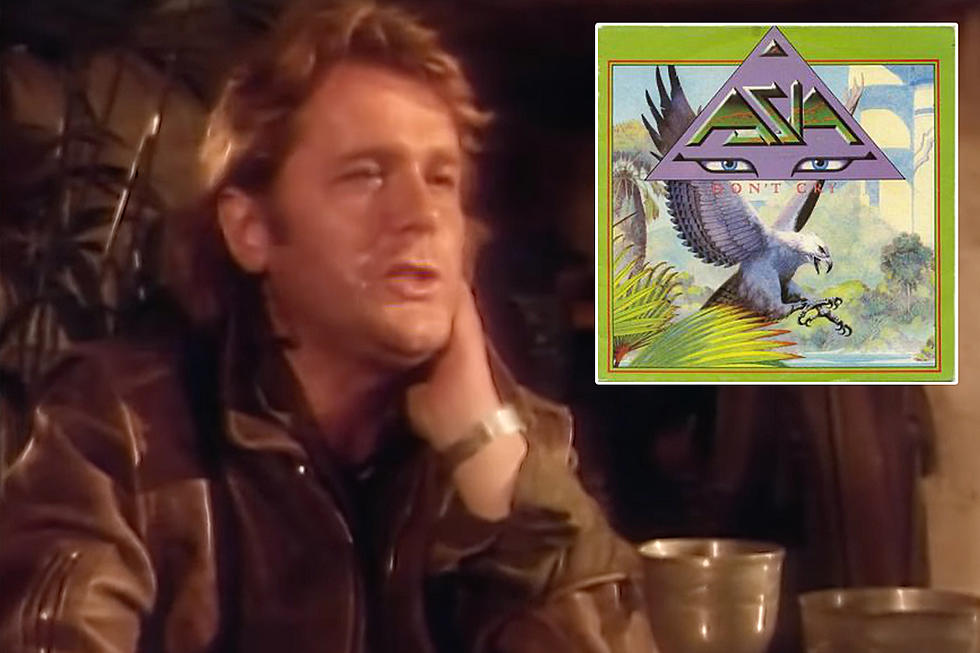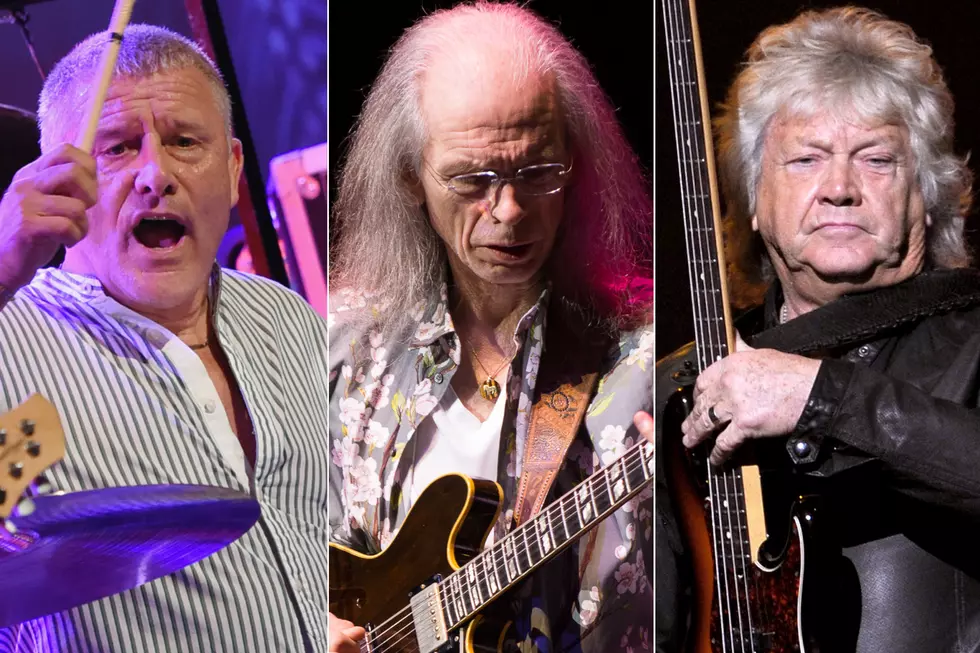30 Years Ago: Asia Go Through Changes to Make ‘Astra’
After setting a new commercial benchmark for rock supergroups with their hugely successful self-titled debut, Asia faced the unenviable task of following it up — and quickly imploded in the process.
In fact, the group weathered a career's worth of potentially disastrous changes in the space of just a few short years, all compounded by the expectations left in the wake of Asia's chart-topping performance in 1982. Rushed back into the studio to capitalize on that album's momentum, the band quickly returned with 1983's Alpha, which was branded a disappointment even after hitting the Top 10, going platinum, and spawning a pair of Top 40 singles. Then, while they were still on tour promoting Alpha, singer and bassist John Wetton — who co-wrote the majority of the songs with keyboard player Geoff Downes — found himself fired from the lineup.
"I was expelled from the group in a Machiavellian conspiracy," Wetton claimed years later. "Management and the record company combined to oust me 'for personal reasons.' They said I drank too much. True. That I was arrogant. True. That I wasn’t a team player. True. But did I deserve to be expelled from the group that I started? No. Would the public accept this blatant travesty? No."
Wetton's ouster occurred just prior to a particularly critical gig: "Asia in Asia," held at the Nippon Budokan Hall in Tokyo, Japan on Dec. 6, 1983, and the first concert in MTV's history to be aired via satellite transmission. Without a frontman but unable to back out of the show, the group enlisted another singing bassist, former Emerson, Lake & Palmer co-founder Greg Lake. He knew Asia drummer Carl Palmer quite well, having worked alongside him for years in ELP, but Lake had little familiarity with Asia's material, and had to rely on a teleprompter during the show.
"I did it as a favor to Carl. He called me up one night and said “Greg, man, I wonder if you could do me a favor?” I thought he wanted to borrow a guitar or something," Lake laughed to Innerviews. "Asia were a funny bunch at that time. I think they’re more settled now. At that point, everyone was firing everyone. There were huge conspiracies. You’d walk down the corridor and there would be people plotting to fire each other in every room you walked into."
Although Lake's voice bore a certain similarity to Wetton's, it wasn't really a proper fit for the band's material, and after making a brief stab at writing new material, he exited Asia following a six-month stint. Given that the group had always been perceived by more cynical listeners as a management-assembled hodgepodge of veterans from ELP, King Crimson, and Yes, the plug-and-play appearance of Lake's aborted tenure only made it easier to dismiss their music as corporate rock by committee.
"It wasn't really the right thing to do. I objected to it," Downes insisted. "But John had a falling out with a few people, and if we were going to do it, it had to be with Greg Lake. It was as simple as that. In a way, when a group gets big very fast, like Asia did, you almost don't have any say about things. You become a cog in the machine, because commercially there's a lot of money at stake."
Downes and Palmer, who'd later insist that Wetton's firing was entirely mandated by the label, decided to move forward after Lake's departure by going back to their former bandmate. And although Wetton quickly returned to the lineup, he made it clear things weren't about to go back to the way they were before.
"I got a phone call from Geoff saying, 'Let's go out and have lunch together and be old pals again.' Which of course we can never be, not after something like that's happened," Wetton told Creem. "I can never classify anyone in the group – apart from [guitarist] Mandy [Meyer], who's had nothing to do with it – as a friend again."
The obvious question, given how acrimonious things had become, was why Wetton would agree to come back at all. "It's called a record contract," he shrugged. "The only other choice I had was to languish. See, if the system that surrounds the group wanted to get really nasty – I'm not saying they would do that, but they could hold me to my contract, let me record songs and not release them. I don't want to find myself in that situation. And having had it from the band that it wasn't really their decision, I agreed to come back and just stay at arm's length. I still have to write with Geoff, but apart from that it's very much at arm's length."
Listen to 'Too Late'
In the midst of all this tumult, the freshly reunited Asia entered the studio to work on their third album — only to face yet another lineup change when, shortly after starting in on a new set of songs, Wetton announced his unwillingness to go on working with guitarist Steve Howe. With Howe out, the band recruited Mandy Meyer, previously a member of the Swiss metal band Krokus.
"When John came back he resented Steve quite a lot, because Steve was responsible for getting Greg Lake in. So it never really worked, and eventually Steve left," explained Downes. "That's when we got Mandy Myers [sic] in, because it was shortly before we were due to start the Astra album. The personnel changes were really demoralizing for the group."
The difficulties of those personnel changes might have been overcome if Asia's fans were still as enthusiastic as they'd been in 1982, but when Astra arrived in November 1985, it became immediately apparent that for whatever reason, the group had lost much of its commercial momentum. Three years after watching their debut top the charts for more than two months, the band members looked on helplessly while Astra stalled out at a disappointing No. 67. The album's sole pop single, "Go," failed to break the Top 40.
All recording careers have their ups and downs, and Astra's performance, while definitely disappointing, wasn't exactly disastrous. Under ordinary circumstances, it might have been just a pit stop on the road to greater success. But under the shadow of the Asia album, it sounded a death knell, and by the following year, the band had dissolved. Downes and Wetton would make a few short-lived attempts at getting various lineups together over the next few years — and Downes ultimately put together a new lineup with singer/bassist John Payne in the early '90s — but the original Asia lineup wouldn't play together again until 2006.
"We had instant success and started at the top from our first day, and not many bands can say that. But when you're at the top, it's an illusion to think that you can stay there," Wetton later pointed out. "We never got a chance to develop in a way that a band should, and it made it difficult."
Yet after finally moving past those difficulties, and shedding the unreasonable expectations of their debut, the original Asia lineup managed a pretty good post-reunion run, putting out three albums (2008's Phoenix, 2010's Omega, and 2012's XXX) and touring consistently. Howe left again in 2013, but the remaining trio carried on with new guitarist Sam Coulson for another studio release, Gravitas, the following year. Whatever they lost with Astra, they were ultimately able to rediscover, even if it took many years to do it.
"We broke up too soon," argued Palmer. "We were unique then, and we still are: English rock with a technical side; sophisticated rock mixed in with melodies and singles. It was taboo in those days, and you very rarely hear that today either."
See Asia and Other Rockers in the Top 100 Albums of the '80s
25 Interesting Rock Movie Facts
More From Ultimate Classic Rock









